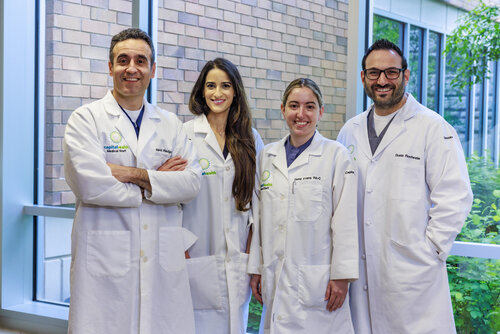Epilepsy is one of the most commonly diagnosed neurological disorders in the United States, but it can be challenging to manage due to the wide range of seizure types, causes, and patient responses to treatment. For patients with medically refractory epilepsy (seizures not responding to two or more medications), physicians at Capital Institute for Neurosciences performed their first stereoelectroencephalography (SEEG), a minimally invasive procedure that can pinpoint areas deep in the brain where difficult-to-treat seizures start. By identifying these locations, neurologists are better equipped to determine the best course of treatment to relieve seizures.
Capital Institute for Neurosciences is the only level 3 epilepsy center in the greater Mercer, Lower Bucks and Northern Burlington county region accredited by the National Association of Epilepsy Centers. Dr. Sidrah Mahmud, medical director of the Epilepsy Center, oversees the medical, neuropsychological, and psychosocial services needed to treat patients, including neuro diagnostic evaluations and surgical services like SEEG.

“Capital Health is known for a commitment to neurological innovation that is driven by patient-centered care,” said Dr. Mahmud, a board certified neurologist and epileptologist. “Each patient has a unique story, so their care journey is guided by a highly skilled team of neurologists, epileptologists, neuosurgeons, neuroradiologists, and neuropsychologists who conduct a range of comprehensive testing. After a thorough review of the patient’s epilepsy history, the data collected from magnetic resonance imaging (MRI), photon emission tomography (PET scans), cognitive testing, and other assessments is used to understand precisely where their seizures are coming from and determine a plan for surgery. With SEEG, patients have an elegant and minimally invasive option that allows us to provide personalized treatment so they can better manage their conditions and see an improved quality of life.”
Neurosurgeons like Dr. Navid Redjal, director of Neurosurgical Oncology, work with a multidisciplinary team to perform SEEG to reach and monitor deeper areas of the brain and target specific locations where difficult-to-treat seizures originate.
“Before surgery, we use advanced imaging software to plan the exact placement of small, thin wires (called stereotactic depth electrodes) in the brain,” said Dr. Redjal, a board certified, Harvard-trained neurosurgeon. “During surgery, a personalized 3D stereotactic platform is used to place the electrodes into the brain with pinpoint precision so we can obtain important information that provides insight into where seizures may begin. The procedure typically takes several hours to complete, followed by a hospital stay that lasts about a week. During this time, Dr. Mahmud and her team monitor the patient’s seizures.”
By monitoring seizures the patient has while the leads are in place, clinicians at the Epilepsy Center can precisely identify areas of concern to determine the appropriate next step in treatment, which may include surgery, responsive neurostimulation, or other therapies. Patients experience no bleeding during surgery and the wires are removed under local anesthesia when testing is complete.
“This is a major advance for our neurosciences team and a great example of the patient-centered collaboration that frequently occurs among clinicians in our various programs,” said Dr. Dustin Rochestie, director of Neurology and Neuro Critical Care and director of the Stroke Program at Capital Institute for Neurosciences. “Now that we offer SEEG, physicians from our Epilepsy Program, Neurosurgery, Neuro Critical Care, and Neurophysiology teams work closely together to provide care for complex conditions and deliver treatment afterward that will help ensure the best possible outcome.”
The Epilepsy Center at Capital Institute for Neurosciences offers acute services for hospital patients as well as those who require long-term follow up by a personally dedicated care team. A range of treatment options are available, including medical or surgical approaches tailored to each patient’s specific needs and a team of epilepsy specialists trained to care for those with more complicated conditions.
To schedule an appointment at Capital Institute for Neurosciences, call 609-537-7300 or visit capitalhealth.org/epilepsy for more information.